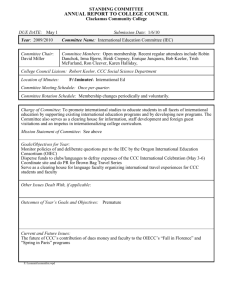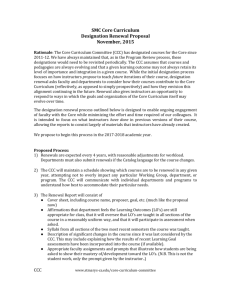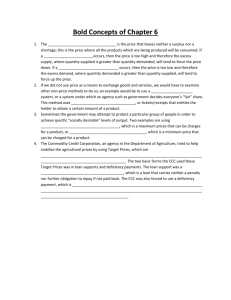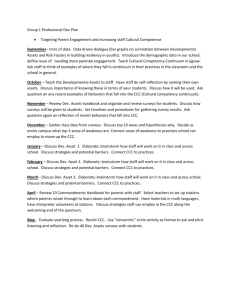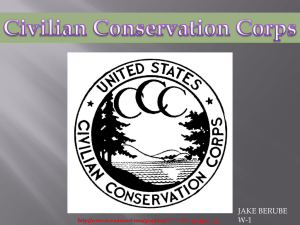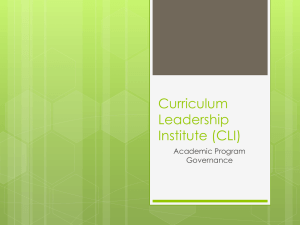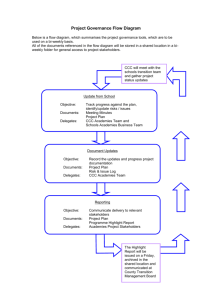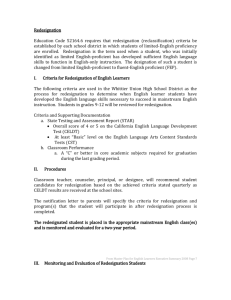UEPC document re: Redesignation of Courses
advertisement
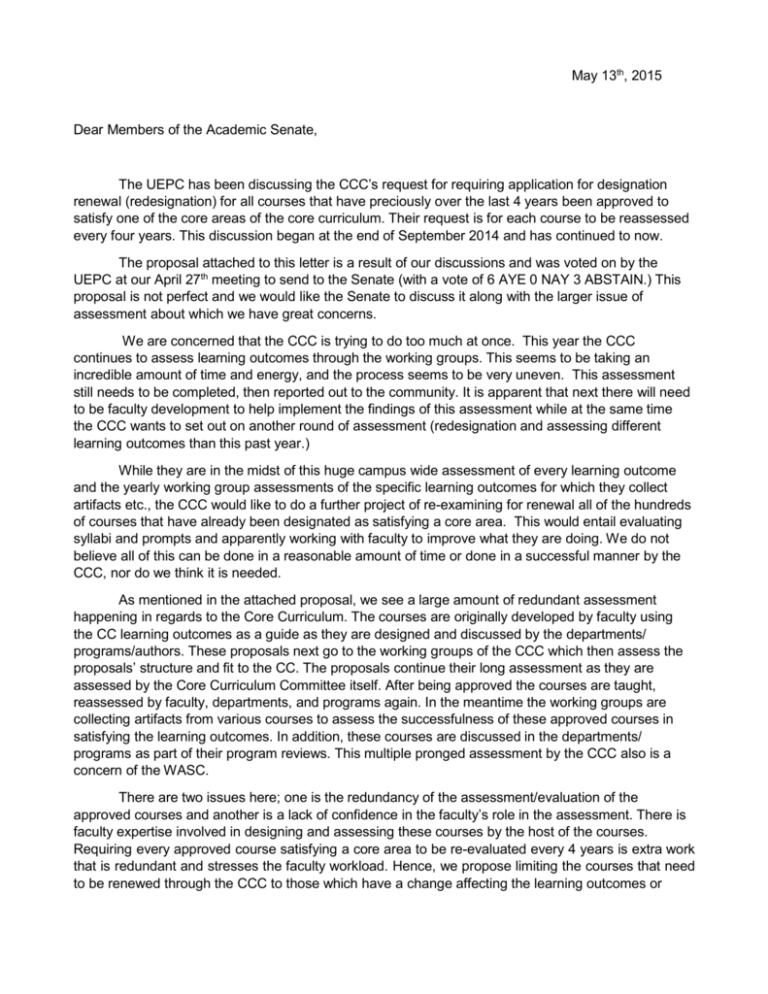
May 13th, 2015 Dear Members of the Academic Senate, The UEPC has been discussing the CCC’s request for requiring application for designation renewal (redesignation) for all courses that have preciously over the last 4 years been approved to satisfy one of the core areas of the core curriculum. Their request is for each course to be reassessed every four years. This discussion began at the end of September 2014 and has continued to now. The proposal attached to this letter is a result of our discussions and was voted on by the UEPC at our April 27th meeting to send to the Senate (with a vote of 6 AYE 0 NAY 3 ABSTAIN.) This proposal is not perfect and we would like the Senate to discuss it along with the larger issue of assessment about which we have great concerns. We are concerned that the CCC is trying to do too much at once. This year the CCC continues to assess learning outcomes through the working groups. This seems to be taking an incredible amount of time and energy, and the process seems to be very uneven. This assessment still needs to be completed, then reported out to the community. It is apparent that next there will need to be faculty development to help implement the findings of this assessment while at the same time the CCC wants to set out on another round of assessment (redesignation and assessing different learning outcomes than this past year.) While they are in the midst of this huge campus wide assessment of every learning outcome and the yearly working group assessments of the specific learning outcomes for which they collect artifacts etc., the CCC would like to do a further project of re-examining for renewal all of the hundreds of courses that have already been designated as satisfying a core area. This would entail evaluating syllabi and prompts and apparently working with faculty to improve what they are doing. We do not believe all of this can be done in a reasonable amount of time or done in a successful manner by the CCC, nor do we think it is needed. As mentioned in the attached proposal, we see a large amount of redundant assessment happening in regards to the Core Curriculum. The courses are originally developed by faculty using the CC learning outcomes as a guide as they are designed and discussed by the departments/ programs/authors. These proposals next go to the working groups of the CCC which then assess the proposals’ structure and fit to the CC. The proposals continue their long assessment as they are assessed by the Core Curriculum Committee itself. After being approved the courses are taught, reassessed by faculty, departments, and programs again. In the meantime the working groups are collecting artifacts from various courses to assess the successfulness of these approved courses in satisfying the learning outcomes. In addition, these courses are discussed in the departments/ programs as part of their program reviews. This multiple pronged assessment by the CCC also is a concern of the WASC. There are two issues here; one is the redundancy of the assessment/evaluation of the approved courses and another is a lack of confidence in the faculty’s role in the assessment. There is faculty expertise involved in designing and assessing these courses by the host of the courses. Requiring every approved course satisfying a core area to be re-evaluated every 4 years is extra work that is redundant and stresses the faculty workload. Hence, we propose limiting the courses that need to be renewed through the CCC to those which have a change affecting the learning outcomes or those classes that are offered in the January Term due to the shortness of that session. This information is stated in our proposal. In terms of the CCC’s work we propose that they simplify the assessment process for the learning outcomes. They need to identify what is the SINGLE most meaningful and most feasible form of assessment and move forward from there. Perhaps once we have that assessment working smoothly there can be a conversation about further types of assessment and the processes that the CCC will use going forward. Sincerely, The Undergraduate Educational Policy Committee Submitted by Kathy Porter, Acting Chair of the UEPC A Proposal to the Senate from the UEPC on the Issue of Redesignation of Courses Previously Approved for a Specific Core Area by the CCC Whereas there are currently multiple assessment processes in which the Core Curriculum Committee (CCC), its Working Groups (WG), the Program Review Board (PRC), and individual departments engage in pedagogical discussion, assessment, and improvements, including those listed in the section below, the Undergraduate Educational Policies Committee proposes that full semester undergraduate courses (non January Term courses) at Saint Mary’s College of California which obtain designation from the CCC in one of the three Core Curriculum areas not be required to apply for redesignation at any time for any reason other than a change in the course which involves or affects one or more of the core curriculum learning outcomes associated with its designation area. Those courses which are required to undergo a redesignation process should be offered a streamlined online form such as the one on the second page of this proposal in which to complete the process. Current Pedagogical Assessments of Courses with Core Designation. 1. Initial Core Curriculum application which involves discussion and assessment by the hosting department, a Core Curriculum working group and the CCC itself. 2. Each year the CC Working Groups collect and study artifacts which are used to study/assess one of the learning outcomes associated with that group’s area. 3. Each year each individual department is required to study and assess one of its learning outcomes which is connected to the core curriculum. 4. Every five years a department must conduct a thorough Program Review. The new guidelines for program review include the following statements under the section II Curriculum Design and Pedagogy part C: For undergraduate programs, discuss how your curriculum is aligned with the Core Curriculum? Please address the following: i) How does your program contribute to core curricula, especially in the Pathways to Knowledge and Engaging the World areas? ii) How have you addressed the requirement for Writing in the Discipline? SMC Core Curriculum Proposal for Redesignation Process There are three categories of course redesignation. They are as follows: (A) The language of any of the course’s learning goals relevant to the core designation is changing. (B) The UEPC notifies the CCC that there is a significant/relevant change in the Catalog language for the course or in the course itself. (C) The course is a January term only CC designated course which has not been assessed by the CC in the past 5 years. Departments are responsible for initiating renewal for courses in category A, while the UEPC is responsible for initiating renewal for courses in category B and individuals teaching a January Term course are responsible for courses in category C. The Renewal Process: The proposals for renewal in Category A and B will be submitted in a timely manner once changes are made or approved (in the B) category. Courses in category C must be submitted with enough time to be approved for the future January term. The CCC will designate a website for the Proposals to be submitted. The webpage will have the following design: There should be a drop down option or a box to type in for each entry. SMC Core Curriculum Designation Renewal Proposal 1. 2. 3. 4. 5. 6. 7. 8. 9. 10. Today’s Date Name of proposer Email of proposer Department/Program of proposer Number and Name of Course If this proposal does not cover all sections of the course, which section does it cover? Core area designation Name of Department/Program course is housed in Name(s) of Chair/Program Director Year of original CC designation 11. Are there any changes in the course’s learning outcomes? Yes No If there are no changes, move to question 12. If there are changes, then upload a page with the old and new learning outcomes along with an explanation for the change in learning outcomes, along with a sample syllabus of a section with the new learning outcomes. 12. Do all sections of the course that are covered by this proposal use the same learning outcomes? Yes No If the answer is “Yes” then upload a sample syllabus from the last time the course was offered. If the answer is “No” to this question upload a sample syllabus for each section that is using a different set of learning outcomes. 13. Please submit two prompts/assignments for each learning outcome that have resulted in successful completion of the learning outcomes.
